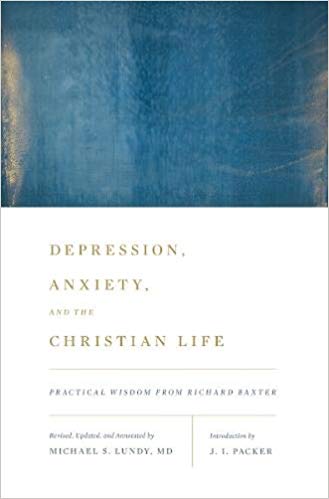⏱️ Estimated Reading Time: 5 min read
Depression and anxiety are no strangers to most of us, although some of us experience it to greater degrees than others. Many of us are silent strugglers, afraid to verbalize our thoughts, feelings, and emotions for fear of being judged, rejected, and considered crazy. And the church at times can cement these fears by neglecting to address it. The problem is, the conversation on depression and anxiety is taking place, and most of the time the conversation doesn’t take the soul into account.
Does the church have something to contribute on these issues? Does the Bible speak to depression and anxiety? Should Pastors and local churches engage in a type of care ministry for those struggling in these particular areas? As a Pastor and Biblical counselor, I believe the answer to these questions is a resounding ‘yes’ and Crossway’s new book, Depression, Anxiety, and the Christian Life: Practical Wisdom from Richard Baxter is an excellent, aid in a biblical care ministry endeavor.
Before I get into some of why this book is helpful, allow me to introduce the contributors. This book is edited and has chapter contributions by Michael S. Lundy and J.I. Packer. Lundy is an experienced physician certified in adult and child psychiatry. Even more important, Lundy is a Christian and brings a holistic perspective to this book in that he views man as more than the body. God also created man with a soul. Packer is a well-known theologian and brings his expertise on the life, theology, and ministry of Baxter to this resource. Together, these men introduce us to Baxter as a spiritual physician (an actual chapter title) and thus set Baxter up to speak to us about the importance issues of depression and anxiety.
Richard Baxter was an English Puritan pastor in the 1600s. He is known best for his work, The Reformed Pastor (one of my personal favorites). Baxter, however, was not just a pastor, he was a lay physician out of necessity (36). Baxter’s experience as both a pastor and lay physician give him a unique perspective and voice for those of us struggling or connected to those who struggle with depression and anxiety.
Lundy and Packer thought this book necessary because they have observed the segregation of body and soul. They write, “Our [Lundy and Packer] independent but similar interests over the years are represented in our now collaborative effort to reduce the (we say) unhelpful and often unwarranted segregation of body and soul, medical and pastoral, theological and psychological” (36).
Packer and Lundy see a real danger in physicians that try to address the body and ignore the soul in the same way there is a danger when pastors address the soul and ignore the body. The Bible promotes a wholistic view of man, and we must keep that in view as Christians.
The physician who addresses only the body may ignore real soul issues that need to be addressed such as personal sin that may be a root cause of spiritual depression and anxiety.
The pastor who ignores the body may make the same mistake as Job’s friends who counseled Job that his suffering was the result of personal sin. In the end, the Lord rebuked Job’s friends for their well-intentioned, but unwise counsel (Job 42:7-17).
When we get into Baxter’s section, we find tender, seasoned advice from a careful shepherd entrusted with broken sheep. Baxter goes to great lengths to define excessive sorrow, diagnose root causes of depression and anxiety that consider the body and soul, and give comprehensive remedies to manage the ailments. Furthermore, Baxter must have kept a detailed account of those he treated with depression and anxiety. He spends time getting into the thoughts and feelings of these often-silent strugglers and provides counsel to those who are in positions to minister to these sufferers.
Baxter discusses depression and anxiety with great tension. He addresses those who may be experiencing depression and anxiety because of habitual sin (he spends considerable time on idleness (123) ). He addresses those who may be suffering from depression and anxiety because of bad doctrine. He also addresses those who may be suffering from depression and anxiety because of a mental illness of sorts (Baxter even discuss demonic body possession (121) . Additionally, Baxter addresses those who have a temperament inclined toward being melancholy.
This tension is perhaps best seen in statements such as “God made both soul and body, and has assigned work for both” (158). In the end, Baxter’s advice to all folks struggling with depression and anxiety is to not only entrust themselves to their pastor, but to “strive for the cure of [the] disease [depression and anxiety] and commit [themselves] to the care of [their] physician and obey him (100). Baxter goes on, “Don’t be like most depressed persons, who will not believe that medication will do them good, but who think it is only their soul that is troubled” (100).
Today, it seems we need to hear the same advice but reversed. We must entrust ourselves to physicians, but also to God-centered shepherds. Don’t be like most depressed persons who will not believe the living and active Word of God will do them good, but who think it is only their body’s chemistry that is troubled.
God made us body and soul. This book captures this well, and I commend it to the depressed, the anxious, and those who are charged to care for them.



